Link:
https://dannyman.toldme.com/2018/03/06/in-a-nutshell-bay-area-housing-shortage/
A question was posed as to whether folks should fight for or flee from the Silicon Valley.
https://twitter.com/hunterwalk/status/970781776007196672
I answered that those who have bought homes here ought to fight for opportunities for the next group. The greater challenge is that a lot of folks who got theirs don’t want to make allowances for the next generations.
https://twitter.com/ztownsend/status/970788140288847872
Feedback Welcome
Link:
https://dannyman.toldme.com/2018/04/11/on-dockless-electric-scooters-i-had-the-last-word/
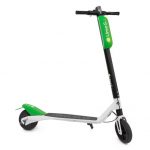
On the drive in this morning, I caught Forum’s program on the new dockless electric scooters that have been showing up in San Francisco. This service is a new take on dockless bike share. There is concern that users are riding on sidewalks, menacing pedestrians, and that despite state laws, they aren’t wearing helmets. Also, the scooters are often left blocking up the sidewalks.
The scooter proponent answered that since the scooters are a handy way to save car trips, San Francisco can continue its efforts to convert car lanes to bike lanes, where the scooters could safely scoot apart from pedestrians. That sounds great to me. The helmets, though … as I pulled up to the office, I emailed in a brief opinion. I then hung back from going into the office for a couple of minutes to catch the very end of the show. I’m glad I did. Michael Krazny closed with this:
We’ll leave it there! Well, except for one more comment about helmets that I want to read here, from Daniel, who says: “We should revisit the helmet requirement. Helmet use is a cultural convention. For example, they don’t wear helmets in Amsterdam or Copenhagen, which makes bicycling even easier in those places. It is safer to wear a helmet when riding in a car, yet we wouldn’t expect anyone to wear a helmet as a requirement to ride in a car.”
I think it would be nice to see these scooters in Peninsula suburbs, where we tend to lack good “last mile” transit options, and where there are fewer pedestrians to upset. Rental electric scooters sound like a better option than rental bikes in a lot of cases because they’re cheap to deploy, require less knowledge to ride, and require less storage space. And I suspect that the helmet requirement is probably unworkable.
Feedback Welcome
Link:
https://dannyman.toldme.com/2018/06/06/why-hard-drives-get-slower-as-you-fill-them-up/
I built a new system (from old parts) yesterday. It is a RAID10 with 4x 8TB disks. While the system is up and running, it takes forever for mdadm to complete “building” the RAID. All the same, I got a little smile from this graph:
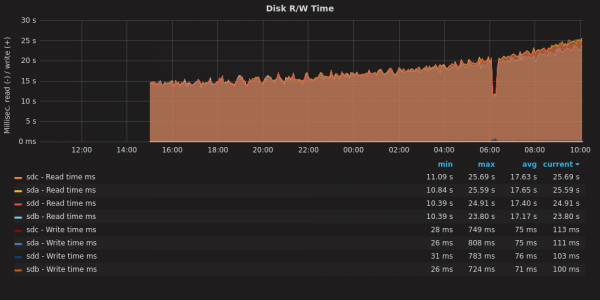
As the RAID assembles, the R/W operations take longer to complete.
The process should be about 20 hours total. As we get move through the job, the read-write operations take longer. Why? I have noticed this before. What happens here is that the disk rotates at a constant speed, but towards the rim you can fit a lot more data than towards the center. The speed with which you access data depends on whether you are talking to the core or to the rim of the magnetic platter.
What the computer does is it uses the fastest part of the disk first, and as the disk gets filled up, it uses the slower parts. With an operation like this that covers the entire disk, you start fast and get slower.
This is part of the reason that your hard drive slows down as it gets filled up: when your disk was new, the computer was using the fast-spinning outer rim. As that fills up, it has to read and write closer to the core. That takes longer. Another factor is that the data might be more segmented, packed into nooks and crannies where space is free, and your Operating System needs to seek those pieces out and assemble them. On a PC, the bigger culprit is probably that you have accumulated a bunch of extra running software that demands system resources.
Feedback Welcome
Link:
https://dannyman.toldme.com/2018/07/25/notes-on-family-bicycles/
One of the drawbacks to suburban life is that it is hard for children to walk to school. The side streets are wide, curvilinear and disconnected, without crosswalks, often without sidewalks, ruled by complacent drivers cruising without concern for road hazards. The main streets have few lights, few crosswalks, and the cars drive fast on their way to and from the highway. Back in Chicago, the side streets were straight, narrow, predictable, consistently punctuated by crosswalks and choked with parked cars, patrolled by wary drivers on the lookout for the unexpected. For a kid walking through the neighborhood, Sunnyvale is scarier than Chicago.
My oldest son starts kindergarten next month, and I still dream of getting him the 1.4 miles to school without a car. Walking with the five-year-old over and back would be a 1-hour time commitment, but I could still be home in plenty of time to drive to work.
But I’d rather bike.
Last year, I took a gamble on buying a Radwagon online. The Radwagon is a cargo bike, and the rear carrier looks like a cozy place for a kid to ride. $2,000 altogether is cheap for a family cargo bicycle, especially with an electric motor. But the back deck is high and my older son shares my childhood aversion to danger. I understand why he doesn’t want to ride back there.
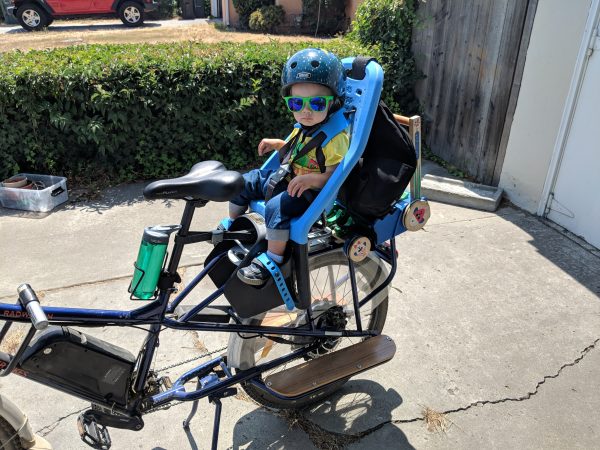
The baby would prefer I spent less time taking pictures and more time pedaling his Radwagon.
Fortunately, the electric assist makes 12+ mile per-way work bicycle commute more feasible on days I am not picking up or dropping off kids. Lately, the younger son has expressed that he really, really, likes to ride on the back of the bike, and has insisted on riding to daycare, which is good for getting me out of the driver’s seat.
Back to kindergarten, though. Tommy’s got at least two neighbors on the block attending the same school. While they wouldn’t be great for my work commute, I have been looking, (only online because we don’t have cool stuff in the South Bay) at cargo bikes. As a budget-minded guy, I have been looking at Bunch, and Wike, which are four-seater cargo trikes, or a Sweet Curry, which is like a non-electric Radwagon with a lower back that could seat three. All of these can be had under $3,000. I am also keeping an open mind around more expensive options: like the Spicy Curry Bosch, Supermarché or Xtracycle’s Edgerunner.
Feedback Welcome
Link:
https://dannyman.toldme.com/2018/08/15/family-bicycling-is-a-privilege-which-is-why-you-should-do-it/
I have spent some time of late working on the “family cycling” problem. I would like to get my kids around town without a car. I would also like to bike to work, which is 10+ miles one way, which is a bit far for me to ride twice every day. Last year, I took a leap of faith and purchased a Radwagon. Around $2,200 all-in, including having a mobile bike shop assemble and deliver it. That is cheap for a bike that can haul kids on the back. It is great for my work commute, but the high back was too scary for my older son.
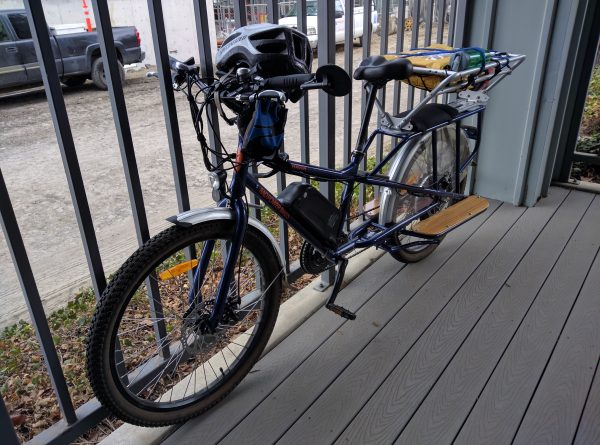
The Radwagon is pretty rad, but the rear cargo deck was too high for the older son to feel comfortable.
After the younger son turned 1, I got a baby seat (another $250, as I recall) and now I have a bike fanatic who loves the high ride adventures. This is great, because I have more encouragement for me to get riding. (Really, these are demands: “Dada, go go go go go! Byyyeee mama! Byyyeee bruhbruh! Dada, shoess!”) This is great, until the older kid starts feeling left out of quality time with Dad.
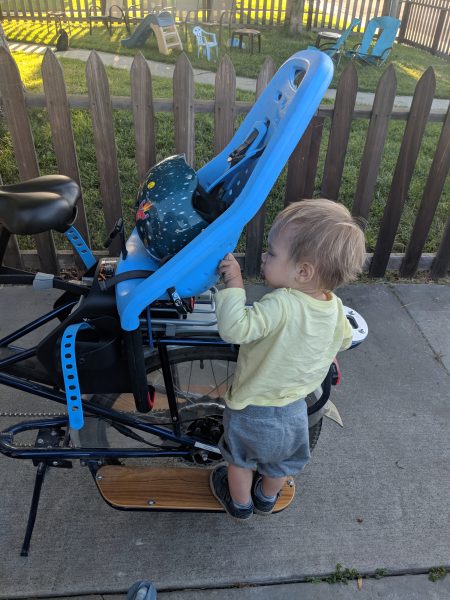
Before he could even walk, he could climb up on the running board of Daddy’s bike.
Thus began my quest for a family bicycle that could accomodate both boys: something lower …
There are a lot of options. There are bikes like the Radwagon but with a smaller wheel in the back, so kids can ride low. Non-motorized bikes from Yuba and Xtracycle start around $2,200. Motorized versions start around $4,500. There are bikes with a box up front: the classic Dutch Bakfiets can be imported from Europe for some insane amount of money. There are box-in-the-front tricycles from Bunch (around $2,600 delivered) and Wike in Canada. The Bunch has an electric option. Finally, I stumbled across Madsen, which sells “bucket bikes” which have a big, sturdy, plastic bucket on the rear that seats four. They start around $2,000, and can deliver at $2,200 (mostly) assembled, but I decided that really, I want to be able to drop kids off and head to work, so all in with e-assist and a few accessories is $3,500.
The next challenge is: a test ride. The Radwagon was a Leap of Faith with mixed results. There are “local” dealers for the more expensive bikes. This would mostly involve calling ahead to set up an appointment to ensure that the appropriate bike(s) are in stock and set up for a test ride, then schlepping the kids up to San Francisco. Fortunately, Madsen has a customer one town over that was willing to share a test ride. I was able to confirm that both boys enjoyed it, and the wife could fit in the bucket, too. The electric option is new for Madsen, so the bike I ordered won’t arrive until later this month.
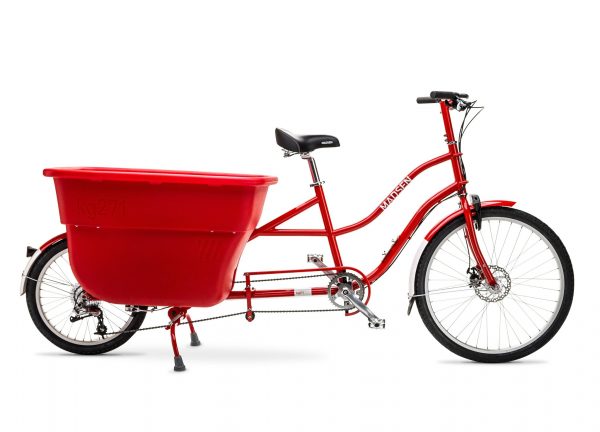
Soon!
Last Month, the Bike Snob published an article that declared that “No, Cycling Isn’t Elitist” which argues that family cycling can be more cost effective than driving. I wish that were true. I wouldn’t say that cycling is elitist, but where I live, where a car is a basic requirement to partipate in economic life, spending additional time and money to research, purchase, store, and maintain a family bicycle remains an act of privilege.
So, what to do: wring your hands and feel like a bougy jackass? On the contrary. I think that if you are in a position to enjoy family biking, and have the means to make it happen, then this is all the more reason to do it. If your family is out on the bike, it helps encourage drivers to be more careful, it opens eyes, and maybe nudges more people of privilege to try it out. Nudges politicians to prioritize safe bicycling infrastructure, which makes it easier for more folks to choose to ride more bikes …
The kids will outgrow the family cycle, and when it comes time to sell, the used bicycles get around the community at prices that are more affordable to folks with less privilege.
See Also: The Edgerunner Philosophy — “It has to do with mushrooms, opportunities, taking risks, and embracing change:”
Luminary mycologist Paul Stamets uses the term “edgerunner†to refer to the profound role that mycelium—an extremely beneficial fungus—plays in Earth’s ecosystems, working at the edges of biological possibility in order to advance life.
As I see it: cycling may not be elitist, but it is definitely more accessible to privileged folks, so if you have the privilege to “work at the edge of possibility” you should consider taking it, in hopes of helping to normalize a beneficial activity and make it more accessible over time.
Feedback Welcome
Link:
https://dannyman.toldme.com/2018/08/29/fcc-should-expand-competition-for-internet-service-providers/
At the behest of my ISP, Sonic, I wrote a letter to the FCC, via https://savecompetition.com/:
Dear FCC,
I am a successful IT professional. I got my start in the 90s, answering phones at an independent ISP and getting folks online with their new modems. This was a great age when folks had a choice of any number of Internet SERVICE Providers who could help them get up and running on AT&T’s local telephone infrastructure.
To this very day, I use the DSL option available from the local Internet Service Provider (Sonic) over AT&T’s wires. I use this despite the fiber optic cable AT&T has hung on the pole in front of my house. Fiber would be so, so much faster, but I’m not going to pay for it until I have a CHOICE of providers, like Sonic, who has always been great about answering the phone and taking care of my Internet SERVICE needs.
Competitive services were the foundation of my career in IT. I believe they were a strong foundation to get Americans online in the first place. Competitive services are, in my opinion, REQUIRED, if you want to get Americans on to modern network technology today.
Feedback Welcome
Link:
https://dannyman.toldme.com/2018/08/30/restrictive-zoning-induces-partisan-shift/
Here is a provocative article from CityLab: How Land-Use Restrictions Make Places Tilt Left
The gist of this is: restrictive zoning makes housing more expensive. The folks who can afford expensive housing tend to be college educated. College educated people tend to be more liberal, and vote Democratic.
If you restrict the amount of housing that can be built in a city, you squeeze out poor folks, and the folks who can afford to buy in are the “Liberal Elites.”
More restrictive counties tend to shed Republicans and become more Democratic over time—a pattern that seems to have accelerated since 2012. And, more restrictive counties tend to gain more college-educated people and shed fewer educated ones, which contributes to their partisan shift. As Sorens notes, college education may causally mediate a substantial part of the relationship between zoning and partisanship at the county level. In other words, a county’s becoming more educated as a result of building restrictions makes it more Democratic.
I think our policies, especially in the privileged suburb where I live, need to allow and facilitate more housing. As a Liberal Democrat, I do not want to live in a bubble community. While I take some pride in the idea that education leads to progressive politics, I am disappointed that a party that prides itself as a champion of the working class and the poor, gains a partisan advantage when the working class and poor get squeezed out of our communities.
As a Democrat in a Blue City, I think we owe a debt to our communities to correct restrictive zoning in order to redress the damage done to our own working class, who can not afford to live here.
Feedback Welcome
Link:
https://dannyman.toldme.com/2018/11/27/brain-reconfiguration/
In my experience, the brain reconfigures its capabilities to adapt to the work you need it to do.
One thing that I notice when working hard in technology is that my short-term memory is shot. I can barely remember the morning, or what was on Forum in the commute in. I think the brain reconfigures itself so that short-term memory is sacrificed for the working stack. I can “load in” a whole bunch of things I’m trying to think about and mesh together and keep track of “in the moment” … good for analysis, but then I lose track of time and can not remember, like I said, the details of the day, so well.
There was a time when I was released from tech, depressed, and found work as a waiter. The initial transition was difficult. I crafted cheat sheets to remind myself of menu items, &c. and spent time trying to translate the algorithms as they had been trained to me into the art of doing the job. I recall a specific hierarchy of five priorities. Let me see if I can recall them all. Greet customers as they come in, bring out hot food, take orders, settle the bill. The rule was that each priority superseded the next … but you can not apply this 100% of the time. One day the restaurant was full, and I was the only waiter, and it was lunchtime on a weekday: people want to get back to the office. I did a good job of getting people settled and getting their food out, but it sucked for that guy who had to wait forever to get his bill. Over time I learned to optimize operations … basically, carpool trips: collect multiple orders on the floor, bring them to the computer, grab a bill, pick up food, deliver food, deliver bill, collect orders, &c.
After some months working in the Pizza Place, my short-term memory got really good. Never quite “don’t write down the orders” good but I think I could have pulled that off if it were an option. (The paper orders went to the kitchen and were later cross-referenced with the computer billing system.) But, when I went backpacking, I was very good at recalling what I spent from day to day, keeping track of those little details over the short to medium term.
In contrast, when I tried to do computer programming, I felt dumb. I remember trying to build an isometric grid system for game programming, and I felt like I just kept running out of brain. Translating grid coordinates to drawing them on a two-dimensional screen whose coordinate system runs from a different direction … I didn’t have it in me.
Then again, neither is that the sort of stuff I end up doing in tech work. Systems Administration is less about deeply abstract thought (well, sometimes it is..) and honestly somewhat like being a waiter, or a restaurant manager. Maybe more of an independent car mechanic. Lots of� things going on, lots of ideas to keep track of, and a fair amount of short-term, deep problem solving: WTF is going on with this server, or this software, &c.
Feedback Welcome
Link:
https://dannyman.toldme.com/2018/12/03/computer-translation/
Back in the 60s, they built a computer to translate between Russian and English. They had a big party to celebrate the first time they booted up the computer, but they had a problem of testing it since nobody was around who spoke Russian. One of the Computer Scientists proposed that they simply feed in an English phrase, translate to Russian, then translate back to English.
They fed in the English phrase: THE SPIRIT IS STRONG BUT THE FLESH IS WEAK
The computer whirred and clicked and spat out the translation.
They keyed the Russian translation back into the computer, which whirred and clicked.
The computer finished its translation: THE VODKA IS GOOD BUT THE MEAT IS ROTTEN
Feedback Welcome
Arrr!
. . .
Avast!
Site Archive






